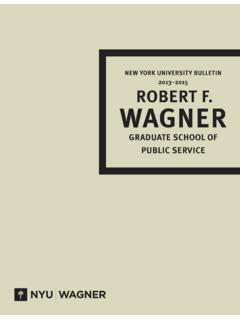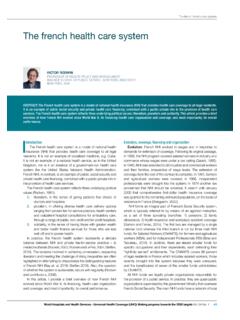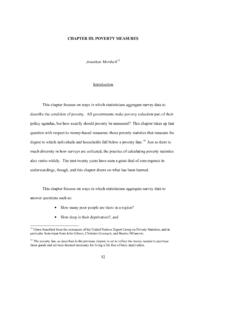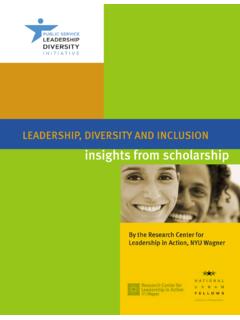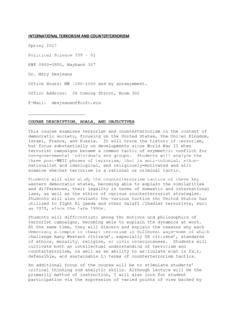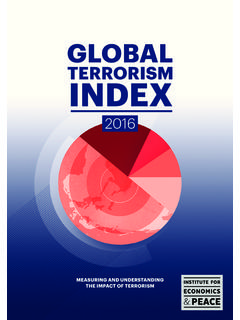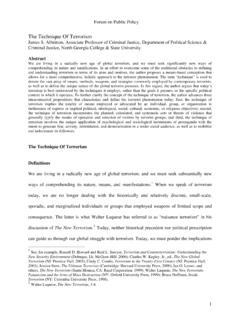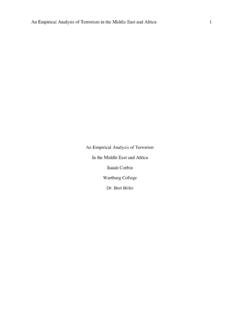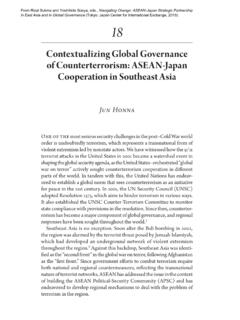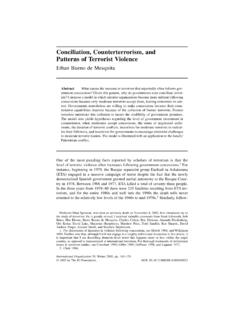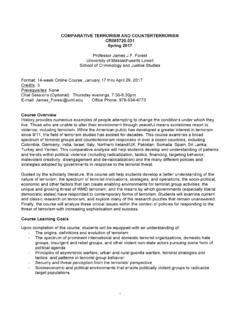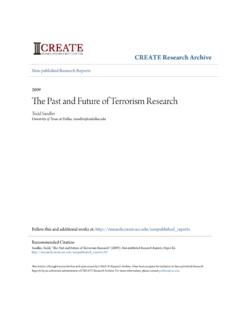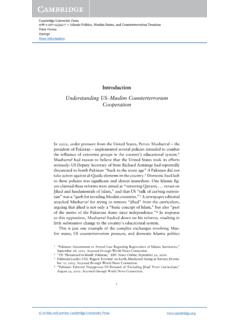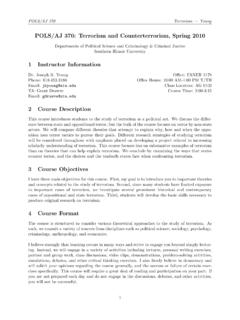Transcription of Terrorism and Counterterrorism Policy - wagner.nyu.edu
1 1 New York University Wagner Graduate School of Public Service PADM-GP 2421 Global Center 379 Terrorism and Counterterrorism Policy Professor Timothy Naftali Email: Fall 2016 Puck 3009 Office Hours: Wednesdays, 11 am-Noon or by email appointment Course Objectives: a) To develop an understanding of the history of Counterterrorism poli cy (especially US poli cy) b) To develop an understanding of the lif ecycles of diff erent historical terr orist organizations and the effectiveness of countermeas ures c) To lear n and understand the var ious instruments for conducting Counterterrorism poli cy d) To ac quire an understanding of the curr ent geopolitical and local (target state) political context in which US Counterterrorism poli cy is developed e) To ac quire an understanding of the curr ent terrorist threat (ISIS/ISIL) f)
2 To explore var ious poli cy options to counter contempora ry terr orist threats. g) To lear n how to writ e a good analytical poli cy memo Course Requirement s: 1) Three short (3-page) papers: (15% x 3) 45% 2) Class Participation: 15% 3) Final (10-page) Long Paper: 40% 2 Course Policies: 1. Shor t Paper Guidelines: Over the course of the semester, the students wil l be required to writ e 3 three-page reac tion papers to the reading. The instructor wil l offer five opportunities to writ e these papers. If the student elects to writ e on more than three only the top three grades wil l count. The topics or questions of eac h paper and it s format, which the instructor wil l provide the students ahead of time, wil l reflect the cases or issues discussed in the class for which it is assigned.
3 Papers must be double-spaced, wit h one-inch margins and numbered pages. They may be emailed to the instructor and ar e due before the start of the cla ss where the issue in question wil l be discussed. 2. Long Paper guideli nes: The long paper wil l be a ten-page analytical study of the lif ecycle of an historical terrorist group that includes an evaluation of the effectiveness of state Counterterrorism strategies/poli cies. The student wil l determine the focus of the paper in consultation wit h the instructor. 3. Moses Center for Students with Disabili ties: If you ar e student wit h a disabilit y who is requesting accommodations, please contact New York Universit y s Moses Center for Students wit h Di sabili ties.
4 You must be registered wit h CSD to receive accommodations. Information about the Moses Center can be found at The Moses Center is located at 726 Broadway (second floor). 4. Religious holidays: NYU s poli cy is to accommodate students observances of religious holi days. In order to receive accommodation, you must notif y the instructor during the first two weeks of the semester of any planned absences related to religious observance. Further details on NYU s poli cies may be found at: 5. Academic honesty: Intell ectual integrity is the universit y s most fundamental commit ment. Plagiar ism of any kind wil l be penalized to the full est possible extent, wit hout war ning or exception.
5 The most common causes of plagiarism ar e not deli berate dishonesty, but stress and uncertainty. You are encouraged to begin assignments well in advance of the deadline, and to check with the instructor if you have any questions. Whenever you draw upon somebody else s words or ideas to make a point, give them credit in a note. If you have questions about documentation requirements, don t guess just ask. For further details on university Policy , strictly adhered to in this class, see Course materials All books wit h an asterisk have been ordered to the NYU Bookstore on Broadway and their purc hase is recommended. Materials found on the course website ar e indicated by a +.
6 * = NYU Bookstore + = Course Websit e 4 September 6: Origins of Terrorism / Counterterrorism Required Reading: 1) Gerard Chaliand and Arnaud Blin, The History of Terrorism : From Antiquity to Al Qaeda, (2007), pp. 175-196; 208-217+ 2) Timothy Naftali, Blind Spot: The Secret History of American Counterterrorism (2005), 1-53+ September 13: Revolutionary Left -Wing Terrorism in Col d War Europe Required Reading (Pick One): a) Donatella della Porta: Social Movements, Political Violence and the State: A Comparative Analysis of Italy and Ger many (1995), 9-54; 83-149+ b) Stefan Aust, Baader-Meinhof: The Inside Story of the (2008), 6-176; 218-228; 305-319; 350-354; 372-420.
7 432-437+ September 20: The Origins of Modern Terrorism and US Counterterrorism 1) Bruce Hoffman, Inside Terrorism (revised edition, 2006), 13-129* 2) Timothy Naftali, Blind Spot: The Secret History of American Counterterrorism (2005), 54-149* September 27: Black September and Israel: Did the Tactics Wor k? 1) Bruce Hoffman, All you Need is Love: How the Terrorists Stopped Terrorism , The Atlantic, December 2001 2) Simon Reeve, One Day in September : The Full Story of the 1972 Munich Olympics Massacre and the Israel i Revenge Oper ation Wrath of God, (2000), 1-124; 160-217; 239-254+ 5 October 4: Reagan and Counterterrorism : Confronting the Problem Required Reading: 1) Li bya 1985-87, documents from the Reagan Presidential Li brary + 2) Timothy Naftali, Blind Spot: The Secret History of American Counterterrorism , New York: Basic Books, 2005, 150-201* 3) Robert Gates, Duty: Memoirs of a Secretary at War (2014), 177-193+ First Response Paper Due: October 4 October 11: Hezbollah: Unintended Consequences and Terrorism as Strategy Required Reading: 1) Andrew McCarthy and Fawaz Gerges, Does Islam Play a Unique Role in Modern Religious Terrorism ?
8 Chapter of Debating Terrorism and Counterterrorism : Conflicting Perspectives, Contexts, and Responses (2010), pp. 100-130+ 2) Augustus Richard Norton, Hez bollah 11-101* Second Response Paper Due: October 11 October 18: Hamas Required Reading: 1) Karin von Hippel, Stuart Gottleib, Does Poverty Serve as a Root Cause of Terrorism ? Chapter of Debating Terrorism and Counterterrorism : Conflicting Perspectives, Contexts, and Responses (2010), pp. 34-66 2) Jean-Pierre Filiu, Gaza: A History (2014), pp. 223-340+ 3) Matthew Levitt, Hamas: Politics, Charity and Terror in the Ser vice of Jihad (2006), 8-168* 6 October 25: Case St udies of Terror ism that Stopped Required Reading: 1) Seth G.
9 Jones and Martin C. Li bicki, How Terrorist Groups End: Lessons for Countering Al Qaida, Rand (2008), pp. 1-43+ Pick one: a) Yoram Schweitzer and Noam Ophir, The Rise and Fall of the International Terrorism Strategy of George Habash s Popular Front for the Li beration of Palestine (PFLP) and its Factions b) Andrew Black, Why do Terrorists Stop?: The Case of the Armed Islamic Group [GIA] c) Jonathan Stevenson, Case Study: The Provisional Irish Republic an Army d) Peter Waldmann, The Tupamaros (Uruguay) and the M-19 (Colombia) Third Response Paper Due: October 25 November 1: Al Qaeda (Pre 9/11) Required Reading: 1) Timothy Naftali, Blind Spot: The Secret History of American Counterterrorism , New York: Basic Books, 2005, 264-274* 2) 9/11 Commission Report (2004), pp.
10 108-143; 174-214; 254-277+ 3) Henry J. Crumpton, Jr., The Art of Intel ligence: Lessons from a Life in the CIA s Clandestine Ser vice (2012), 121-160+ November 8: Afg hanistan Required Reading: 1) David Kilcullen, The Accidental Guerrilla: Fighting Small Wars in the Middle of a Major One (2008), xiii-xix; preface, prologue, 1-114 * 2) Fotini Christia & Michael Semple, How to Flip the Taliban, and Steven Simon, Is 7 Nation Building Doomed? Foreign Affairs, July/August 2009+ November 15: Iraq Creating Terrorism ? Required Reading: 1) F. Gregory Gauss III and Jennifer Windsor, Can Spreading Democracy Help Defeat Terrorism ? Chapter of Debating Terrorism and Counterterrorism : Conflicting Perspectives, Contexts, and Responses (2010) 235-271+ 2) Kilcullen, The Accidental Guerrila, 115-185* 3) Thomas Ricks, Fiasco: The American Military Adventure in Iraq (2007), 149-269* 4) Robert Gates, Duty, pp.

